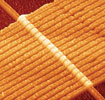Memristors perform logic, too
12 May 2010
News
Researchers from HP have announced advancements in memristor technology that could change the way computer systems are designed while better equipping them to process the current ‘information explosion.’
The researchers have discovered that the memristor – a resistor with memory that represents the fourth basic circuit element in electrical engineering – has more capabilities than was previously thought. In addition to being useful in storage devices, the memristor can perform logic, enabling computation to one day be performed in chips where data is stored, rather than on a specialised central processing unit.
The latest findings about the memristor are detailed in a paper published this week in the journal Nature by six researchers at HP’s Information and Quantum Systems Lab, led by R. Stanley Williams. These developments follow the HP Labs team’s initial demonstration of the existence of the memristor in 2008. HP has created development-ready architectures for memory chips using memristors and believes it is possible that devices incorporating the element could come to market within the next few years.
An image of a circuit with 17 memristors captured by an atomic force microscope. Each memristor is composed of two layers of titanium dioxide connected by wire. As electrical current is applied to one layer, the small signal resistance of the other layer is changed, which may in turn be used as a method to register data
HP researchers have also designed a new architecture within which multiple layers of memristor memory can be stacked on top of each other in a single chip. In five years, such chips could be used to create handheld devices that offer 10 times greater embedded memory than exists today or to power supercomputers that allow work like movie rendering and genomic research to be done dramatically faster than Moore’s Law suggests is possible.
Eventually, memristor-based processors might replace the silicon in the smart display screens found in e-readers and could one day even become the successors to silicon on a larger scale. Memristors require less energy to operate and are faster than present solid-state storage technologies such as Flash memory, and they can store at least twice as much data in the same area. They are virtually immune to radiation, which can disrupt transistor-based technologies – making them an attractive way to enable ever smaller but more powerful devices. Because they do not ‘forget,’ memristors can enable computers that turn on and off like a light switch.
According to Williams, “Memristive devices could change the standard paradigm of computing by enabling calculations to be performed in the chips where data is stored rather than in a specialised central processing unit. Thus, we anticipate the ability to make more compact and power-efficient computing systems well into the future, even after it is no longer possible to make transistors smaller via the traditional Moore’s Law approach.”
Further reading:
Electronic News Digest
News
A brief synopsis of current global news relating to the electronic engineering fields with regards to company finances, general company news, and engineering technologies.
Read more...
4000 A containerised DB for power project
News
Power Process Systems has successfully completed the design, fabrication, and commissioning of a 4000 A containerised distribution board for a wind/PV solar hybrid renewable energy project.
Read more...
Datacentrix Industrial Indaba 2025
News
Datacentrix recently hosted its inaugural Industrial Indaba 2025, where industry leaders explored how digitalisation, resilience, security and compliance are shaping the future of sustainable industrial operations in Africa.
Read more...
RS brings solar light to 150 000 people
RS South Africa
News
The company’s three-year partnership with SolarAid aims to raise £1 million through corporate donations, matched funding, product contributions, and fundraising to accelerate access to safe, sustainable energy.
Read more...
Microchip and AVIVA Links collaboration
Altron Arrow
News
Microchip and AVIVA Links have achieved groundbreaking ASA-ML interoperability, accelerating the shift to open standards for automotive connectivity.
Read more...
World’s leading supplier of grid automation products
News
Hitachi Energy was recognised as the global market share leader in grid automation for electric power transmission and distribution utilities by ARC Advisory Group.
Read more...
Vivashan Muthan appointed as head of export sales and operations at RS South Africa
RS South Africa
News
With a career spanning engineering, business development, and sales leadership across sub-Saharan Africa, Vivashan Muthan brings a wealth of expertise to his new role as head of export sales and operations.
Read more...
Google equips university students across Africa with free access to advanced AI tools
News
A 12-month Google AI Pro plan has been launched for students in Ghana, Kenya, Nigeria, Rwanda, South Africa, and Zimbabwe to build foundational AI skills.
Read more...
Africa’s space economy projected to be worth $22,6 billion in 2026
News
South Africa is gearing up to be at the forefront of the growth in the space industry, creating thousands of jobs, driving innovation, and boosting the national economy.
Read more...
Distribution partnership with MacDermid Alpha
Testerion
News
MacDermid Alpha Electronics Solutions India Private Limited has announced that as of 01 September 2025 Testerion will be the sole importer and distributor of their products to the South African market.
Read more...


